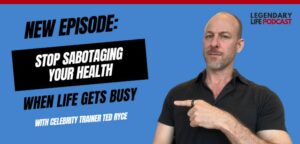Have you ever had a genuine, inspired impulse to hit the gym and start eating healthy? Maybe someone said or did something about your fitness condition, and you just felt compelled to prove them wrong.
You felt inspired; you had a reason to start working out, put your stuff together, and get in shape. In other words, you felt motivated.
Let me ask you this, how did that end? For how long were you able to maintain that discipline? Not much, right? Is it because there’s something wrong with you? Absolutely not; it is because you didn’t know how behaviour works.
In this Ted Talk, Ted reveals why motivation is a lie, especially when used as the core of a fat loss journey.
He explains why most people, if not all of them, fail to lose weight when relying exclusively on motivation. Plus, he shares the principles of behaviorism, describes how human behavior works, and the three behaviour reinforcers.
Ted also demonstrates how you can be more consistent with your workout and diet in the long run by understanding how you respond to positive and negative reinforcers and punishment. Listen now!
You’ll learn:
- What drives your behavior?
- Why do you fail every time you trust your motivation to lose weight?
- What are the behavior reinforcers, and how do they work?
- Is it possible to feel good about quitting?
- Why understanding how behavior works can help you lose fat
- Is it possible to lose fat and avoid social awkwardness?
- And much more…
Related Episodes:
Ted Talk 78: Motivation Isn’t Enough. Environment Literally Shapes Your Life
Ted Talk 46: Get Off Your Butt: How To Regain Momentum & Motivation
Links Mentioned:
Schedule a 15-Min Strategy Call
Do You Need Help Creating A Lean Energetic Body And Still Enjoy Life?
We help successful entrepreneurs, executives, and other high-performers burn fat, transform their bodies, and grow successful businesses while enjoying their social life, vacations, and lifestyle.
If you’re ready to have the body you deserve, look and feel younger, and say goodbye to time-consuming workouts and crazy diets, we can help you.
Click Here To Schedule Your 15-Min Strategy Call!
Or go to legendarylifeprogram.com/free to watch my FREE Body Breakthrough Masterclass.
Podcast Transcription: Motivation Is A Lie (Here's What Actually Works)
Ted Ryce: Have you ever told yourself that if you could just find the motivation to exercise and eat right, you'd have the health you want, you'd have the body you want? All you need is that motivation, and that would solve everything. That's what I call “The Motivation Lie”.
And back when I started helping people with their health, over two decades ago, I believed that, too. But now I know, that is not how behavior works, that is not how you get someone to success.
And today, I want to share with you what actually drives behavior. So, if you've told yourself that lie about the motivation, this episode is for you. So, what is up, my friend? Welcome back to the Legendary Life podcast, I'm your host, Ted Ryce, coach to executives, entrepreneurs, and other high-performing professionals. Now, let's dive right in.
When I first started personal training back in 1999 in Miami Beach, I was under the impression for the first few years of my career that people just needed the right information. They didn't have the right information, they didn't have the right instruction, and once they got that, they'd be fine. They'd get into great shape, and that would be the end of their problems.
23 years later, I know that's just—it doesn't work like. And today, what I'm going to share with you, these principles, they're going to help you to understand, well, first of all, why what I do is way different than what other coaches do. And also, you're going to learn these things and you'll be able to apply them, or at least start to think about applying them to your own behavior so that you can get better results with your health.
And the first thing I want to talk about is a behavioral model called Behaviorism. And the idea is really simple; we learn behaviors through practical, through experience. We learn behaviors through experience. And then the second concept here, because that's quite simple, is that certain things make us more likely or less likely to start a behavior, or to keep a behavior up.
And you've probably heard these ideas before, positive reinforcement, negative reinforcement, and punishment. So, these things are crucial to understand how to get started with a behavior, but also how to keep a behavior up.
So, let's get into it. I'm going to talk about the different forms of reinforcement, I'm going to talk about punishment, and then we're going to get into some specifics, how this relates to how you can start to change your own behavior and get better results.
So, positive reinforcement is quite simple. Rewards increase behavior, in other words, we do things that make us feel good. I think the easiest example of this is, when you eat something delicious, “Hmm, oh my gosh, this is delicious.” That's the reward.
In fact, I eat something—quite a few delicious things today. And let's say that you go to the gym, and do the right amount of exercise. So, you don't beat yourself up, and I want you to pay attention, because we're going to come back to this idea later.
Let's say, you go to the gym, and you do a workout that instead of beating yourself up, you actually make yourself feel better afterwards. And so, you get a reward from exercise.
So, let's talk about negative reinforcement. This is the idea that something negative is happening, and when you do a behavior, it stops the negative stimulus. Really easy example is, have you ever gotten into a car, and you didn't put on your seatbelt right away, and the car just starts, ding, ding, ding, ding, and you're like, “Oh my gosh, oh, I got to stop that ding, it's really annoying.”
So, you plug your seatbelt in, and, “Ah, gosh.” There's a reason that car manufacturers do that, it works. By plugging your seatbelt in, putting your seatbelt on, it stops the dinging and right, negative reinforcement.
Then there's punishment, like for example, when I was over at my cousin’s house, and my nephews, my two nephews—I guess they were my second cousins, but we call them nephews because they're 10 and 13. Love those kids, but they were arguing with each other. And my cousin stepped in and said, “Okay, you're going to argue like this, you're not going to stop, boom! We're going to punish you by taking away your Xbox time today.” So, they didn't get to play Xbox.
And the reason he did it, I don't know if it worked or not, I don't have kids, but he was doing it because he was trying to decrease, he was trying to get them to stop fighting. And you know, there's some other things here, where, have you ever heard of the Blackmail Diet?
So, that was a diet where the guy, he was a Jewish man. And I forget the amount, but he was going to give like the Neo-Nazi group, some local Neo-Nazi group, or some Neo-Nazi group in the United States, he was going to give them thousands of dollars, if he didn't stick with his diet. Extreme example, but he wrote a book about it, called The Blackmail Diet, and it illustrates the punishment.
Now, more personally, I was part of an entrepreneur group where if we didn't follow through with something that we were going to do, we had to burn a hundred dollars bill. Now, let me tell you, I'm okay with spending money or investing money, or helping someone with money, but just burning money, just throwing money away that really bothers me.
And my specific behavior was, I was having calls with potential clients for my coaching group, and I wasn't recording them. And the idea was, hey, Ted, you need to start recording your calls with your potential clients, and if you don't do that, you're going to have to burn a hundred dollars.
And I said, okay, because we were committed to the group, and guess how many hundred dollars bills I burned? Zero, okay? I recorded every single call with a potential client, there's no way I was going to burn a hundred bucks.
And this is really important, because if it would've been, hey, for every time you don't record a client conversation, or a conversation with a potential client, we're going to give a hundred dollars to the charity that you care about the most.
That's not as strong, right? You feel like you're doing a good thing, but burning a hundred dollars, I just couldn't, I can't deal with that, I recorded every conversation. So, that gives you an example, and a few stories to understand positive reinforcement, negative reinforcement, and punishment.
So, let's talk about how these play a role in changing your body, losing weight, eating better, exercising regular. And I want to share these principles through what I deal with, with my clients.
So, when my clients first sign up with me, there's a reason that they're signing up with me, they're not saying, Ted, I feel amazing, my health is great, I'm so happy with the way I look in the mirror, and here I am to work with you. I can't remember if I've ever had that conversation.
What the conversation is, is this: “Ted, I'm not happy with what I'm doing right now, my back hurts from the types of workouts I'm doing, and I feel like I'm working so hard in the gym and eating clean, and I'm not seeing the results that I want, and it's extremely frustrating.” So, in other words, negative reinforcement, they're trying to remove this negative feeling, so, they're hopping on a call with me.
Or, another example would be, “Ted, I'm sick and tired of trying to run after my kids and getting out of breath. Or I'm sick and tired of seeing myself in the mirror every morning, and feeling like that ruins my day. I wake up, I look at myself,” I've had several clients tell me this, both men and women, by the way. “I look in the mirror, I see myself, I'm disgusted.”
And that sets the tone of my day. And so, they're on a call with me. So, they're on a call with me because they hope that they're going to remove this negative feeling that they have. And their motivation is really high. And so, what my job is, is this: what most people do, let me preface my, before I get into what my job is, let me tell you what most people do, that motivation is also represented, it's got a negative thing to it, a negative aspect to it, let's say.
So, they're not like, hey, I'm super motivated, I'm not happy with how I look, but let's go about this getting-in-shape thing in a sensible way. No, what they do, what most people do is like, hey, I'm going to cut out the sugar, I'm going to stop drinking, I'm going to eat nothing but chicken and broccoli, and I'm going to go to the gym, and I'm going to push myself hard.
And what happens? Well, initially they start to feel better, they get the positive reinforcement, they start to feel like, oh, well, I'm doing better things for myself, I'm exercising now, I'm eating better now. And so, it starts out as positive reinforcement, but after maybe a couple weeks of that, or a couple months maybe for the extremely mentally tough, your body feels beat up, because you're doing too much exercise.
And you're not eating enough calories potentially, or it's too strict of a eating plan to stick with, and then it starts to become negative. So, are you clear with that? Pay attention here, because it starts off as positive, and that's why people can keep something up, they're getting a reward for their behaviors.
But when they do it for long enough, if they're doing it improperly, it starts to become negative. Then they stop eating strictly, why? Because it's a negative feeling. Why do they stop exercising? Because the exercise, it's either taking too much time, or is hurting their body, there's a lot of reasons, but it becomes a negative, and so they quit.
And then they feel better when they quit. Does that sound familiar? Has that ever happened to you? And then you go backwards, and then you start gaining the weight and getting out of shape, and maybe you lost a few pounds, and now the pounds are coming back, and then that starts to be negative.
And then you go through the cycle year after year, bouncing back in between feeling good for taking action, because you were feeling bad for being out of shape, to feeling good after stopping your strict diet and hard workout, because it became a negative experience for you, does that resonate? Because I see that all the time.
So, let me tell you what my job is, my job is to constantly make—it's to make people enjoy what they're doing. Yes, there's going to be sacrifices, you can't just eat ice cream for lunch and chocolate cake for dinner, and then almond croissants for breakfast. But you can eat what you want, within reason, and still lose body fat, or still maintain fat loss.
So, I make sure people are doing—they're not going too strict, but they're let's say, restrictive enough, they're restricting calories enough that causes fat loss. And it takes time to figure this out, but once you dial it in, and make it a positive experience for a client, whew! Our clients lose, I've got a client that's lost 60 pounds in maybe 9 months. He's totally ripped.
I've got another client who lost 20 pounds in 2 month, two and a half, no 2 months, and then we just kept him ripped, and he's still going out and drinking alcohol, and traveling to Italy, and eating black truffle pasta dishes, and pizza, and enjoying his life. Not all the time, but he knows how to balance it, so that his life is enjoyable.
And also with the workouts, I've had to give him—this particular client, the same one I'm just talking about, Mr. Black Truffle Pasta in Italy guy, Trevor, is his name. You may have heard his interview here on the show. We've had to change his workouts, because he has more time in the winter, less time in the summer.
So, we've had to change around his workouts to reflect his schedule so the workouts don't become a negative. Still with me? I hope so, because I feel like this is what it's all about here.
And my job again, is to make the process as rewarding as possible, so that my clients feel good doing it. If it starts to become negative, I start to listen for—and you can do this for yourself too, if you start to say, well, I really don't like my workouts, they're too long, or I don't like this exercise, I hate this exercise, I'm sick of it, not it's hard, but I see the value in doing it, but I hate this exercise. If I never do this exercise again, that's going to improve my life.
So, I change out exercises. I help people find the routines that they feel good doing, sometimes that’s keeping the workout short. It's more important to build a habit of consistency with exercise, by using a 10 minute workout, like I did for my client, my auditor client, Barbara, for example.
We started with 10 minutes, and she did them in her office with dumbbells, while listening to Zoom meetings that she didn't have to participate in other than listening. So, those are all examples of making it work for someone so it didn't start to become a negative to their life.
Let me tell you, Barbara lost over, I think almost over 30 pounds, I think. Worked with me through busy season, started off working out in her office, I can't wait to get her on this show, she also had other personal issues, family members getting sick, and she did it all. And we had to maintain for a few months here and there, because of how busy she was, and how stress she was when her family members were sick.
But man, just incredible transformation, changed her life. And not just her life now, but the trajectory of her life in the future. And this is the power of when you can get this right, when you dial this in right, so that you're getting more positive reinforcement from your choices.
You don't feel overly strict with what you're doing, food wise. You don't feel like you're beating your body up with exercise. This is the key, folks. Or spending too long in the gym, that's another one. Too long in the gym. You don't have to. You can change your body in as little as 10 or 15 minute resistance training workouts. Cardio is a little bit different.
So, these are the keys, folks, human behavior, now look, the application of these can be quite complicated, but these are the principles that when you start to develop the awareness, because it's really crucial, even with my clients, it's not magic, I need them to communicate with me. Hey, how are you feeling?
Do you feel like you can? What needs to change here? Do you feel like you need to change something? How are your workouts doing? Does anything need to change there?
And when you dial it in to where you're like, wow! Like what my client, Lisa said, she lost over 20 pounds with me. But more important than the scale win, which is, a lot of people lose weight, people are always impressed by the number, but never impressed as much as they should be with what she told me. And she told me, hey, I love my workouts, I love them.
And that's how I know that I'm on the right track. And that's how you can know that you're on the right track, when you love what you're doing. Now, you should be getting results too, and that becomes another negative for people. They might enjoy the type of exercise that they do, but they're not seeing results from their efforts.
That can be another source of stress, another source of let's say, you feel like you're working so hard, I'm not sure which one that would be, I guess that would be more like a punishment. You step on the scale after working so hard, and trying to eat clean, and the scale doesn't change, and that's almost like a punishment, and it makes you decrease your behavior.
But when you dial this in right, like what we do with our clients in our coaching program, whoa! Magic happens, transformation happens, people can be more consistent than they've ever been before. And the best part about it, they don't feel like it's taking a lot of work.
If you listen to the testimonials that I share with you, the client success stories, you'll hear, ‘it wasn't as hard as I thought it would be. It's the easiest approach I've ever done.’
And that, my friends, is what you're looking for, whether you're working with me, whether you're working with another coach, or whether you're doing it on your own, that's what you're looking for, where you feel like, man, this is effortless. I'm getting results, I really enjoy what I'm doing, I enjoy my exercises.
I feel like have enough flexibility with my diet, where I can eat the things I want, and be social with my family, I don't have to be the person packing their meals and busting out the Tupperware at family dinner time, and creating that awkward social moment. That's what we're looking for.
And that is what creates long term change, is what I want to propose to you. So, that's it for me today, let's just recap the ideas here. So, we talked about behaviorism, this idea that learning happens through experience. And then we also talked about the reinforcers of behavior.
We talked about positive reinforcement, when you get a reward and that reward increases a behavior. That can work for you, and doing a workout that makes you feel good after, or work against you, when someone serves you a delicious dessert.
And we talked about negative reinforcement, where there's a negative stimulus, and that negative stimulus, for my clients, it's usually, “I can't stand looking at myself anymore. I need to do something about this,” and they want to get rid of, they want to remove that feeling. And so, they hop on a call with me.
And then there's punishment. So, I think two examples just to give a couple of examples before we wrap up here. Doing a workout that hurts your joints, that's going to decrease your behavior, doing a workout that causes you stress, because it's taking too long.
Or following a strict diet like keto, when you just want to eat some damn bread, or you just want to have a sandwich, starts to decrease behaviors, and that's what leads to failure. What happens is, your approach starts to become like a punishment, instead of something that's improving your life.
So, let me wrap up here, and ask you, what is the big idea from listening to today's episode? What is the, let's say, the golden nugget, the big takeaway that you can apply right now, immediately into what you're doing to improve your health? That's what I want you to think about. Hope you enjoyed today's episode, and I'll speak to you on Monday.
Sign up to receive email updates
Enter your name and email address below and I'll send you periodic updates about the podcast.









